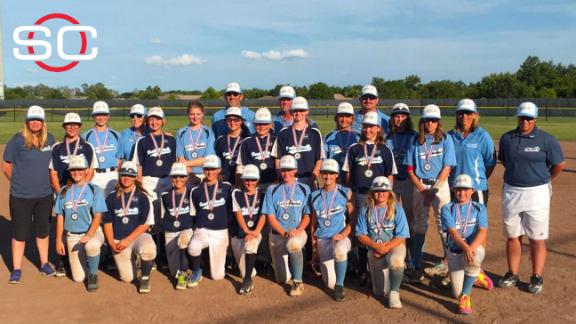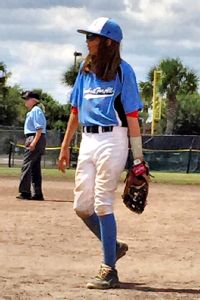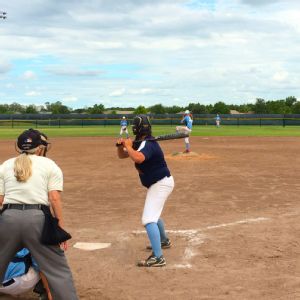Baseball For All founder Justine Siegal discusses the importance of providing opportunities to girls to play baseball and develop their skills.


KISSIMMEE, Fla. — “The girls here have good sportsmanship,” Grace DeVinney said as she plopped down on a wooden picnic bench, happy to steal a few minutes in the shade. “Better than boys.”
In about 90 minutes, DeVinney’s team, the Central Florida Rays, would face the Carolina Terminators in the championship game of the first all-girls national baseball tournament.
DeVinney, an 11-year-old from Longwood, Florida, is tall with big eyes and thick, shaggy hair that she refuses to pull back in a ponytail or tuck behind her ears. She has an easy way of carrying herself and a throwback vibe, like someone plucked her right off the set of “The Bad News Bears.”
Like nearly all the players at the tournament held at the Fortune Road Sports Complex, she is the only girl on her hometown baseball team. This week, she finally got a chance to play with and against other girls.
“When the girls lose, they don’t disrespect each other,” she said. “We don’t stomp, and we don’t let losing get to us. We’re just more competitive than the boys. When we lose, we get more pumped up and keep going at it.”
DeVinney knows a thing or two about watching boys lose. In May, she was part of an all-girls Baseball For All team that made headlines by winning a USSSA Tournament against all-boys teams in southern California.
Back home in Longwood, she helps her all-boys Dixie Youth Baseball team beat teams full of boys all the time. But she dreams of being able to play girls’ baseball full-time.
Justine Siegel hopes to make that dream a reality — not just for DeVinney, but for future generations of girls. The national tournament, a six-day event held in Kissimmee, Florida, is the brainchild of Siegel and her nonprofit, Baseball For All, which is dedicated to increasing opportunities for girls in the game. The event drew 12 teams of 10 13-year-olds from all over the country, as well as a group of 8- to 10-year-olds who participated in clinics and played in developmental games.
Over the course of the tournament, the girls got to work with a handful of mentors, including knuckleballer Chelsea Baker, who pitched batting practice for the Tampa Bay Rays last year, and Ghazaleh “Oz” Sailors, who just finished her college pitching career and inked a deal with the Virginia Marlins in the World Baseball League.
The girls got autographs and advice from former All-American Girls Professional Baseball League players Maybelle Blair and Shirley Burkovich and attended a clinic put on by MLB Director of Umpire Development Rich Rieker. The tournament was a crash course in baseball, its rules and its history put on by a woman who has spent most of her life around the game.
Siegel grew up playing baseball, went on to coach in both the men’s collegiate and professional ranks, and was the first woman to throw batting practice to an MLB team. She started Baseball For All in 1998 as a 23-year-old in Cleveland. For her “day job,” she’s the director of sports partnerships at Northeastern University’s Center for the Study of Sport in Society.
Over the years, Siegel has learned from every small tournament she has run, every parent who has yelled at her and every girl she has helped coach. She put all that knowledge into creating the tournament in Kissimmee, which she believes will be a turning point for girls in baseball.
“So much of what we do is just about the idea that once they see it, people will understand,” she said. “I’m optimistic that after seeing the success of this tournament, the national youth baseball organizations, like Little League, Dixie and PONY, will want to get involved and create a girls baseball program.”

Grace DeVinney was part of an all-girls Baseball For All team that made headlines by winning a USSSA Tournament against all-boys teams in southern California.
Women played baseball in leagues and at colleges dating to the 1830s. The pro league made famous by the movie “A League Of Their Own” spanned 12 years, with more than 600 women playing pro ball. Girls fought for and won the right to play Little League more than 40 years ago. Yet girls are still fighting to play baseball.
“I have hundreds of stories — and I’m sure I could collect thousands — of girls being treated poorly,” Siegel said. “Being stuck in right field, being flatly told to quit. That’s the inherent discrimination the national baseball organizations need to step to.”
DeVinney knows all too well how tough it can be playing baseball as a young girl. She says she gets a fair shake on her current team, coached by her dad, but remembers the first team she played on, when she always batted last and got stuck in right field, even though she was far from the worst player on the team.
Others at the tournament talked about similarly disappointing experiences. A 10-year-old from Los Angeles — who once told her first-grade teacher she wanted to be the next Jackie Robinson — gets batted last in her Little League lineup, no matter how much she improves or how many boys she outplays. A mother from San Francisco finds the coaches in her daughter’s league tend to care more about getting their sons to all-star games than creating a good experience for all the kids.
For some girls, the path has been a little easier. Two of the tournament’s top players, the Carolina Terminators’ Taylor Bowen and the New Mexico Fusion’s Kendra Levesque, follow in the footsteps of older brothers.
Bowen, whose fastball tops out at about 68 mph, is not only the first girl to play on the Grifton Middle School baseball team in Grifton, North Carolina, but also the MVP last season, as a seventh grader. She hasn’t had any trouble fitting in in middle school, but she is not yet sure how welcoming people at the high school will be, though her brother earned all-county honors there.
Bowen likes striking out the boys — “It’s great when they go back and slam their helmet and cry,” she giggled — but she loved the chance to play alongside other girls, including Levesque, who was her teammate on Baseball For All’s Sparks team last year in Cooperstown.

Taylor Bowen pitches to Kendra Levesque at the Baseball For All girls tournament.
Levesque, who sports a long, thick braid and boasts a smile as big as her swing, won the Home Run Derby at the Cooperstown event by beating 104 boys. She’s also got an arm and hits nearly 70 on the gun. Levesque first played baseball at the age of 4, when her older brother needed her to fill in on his shorthanded team.
“It just clicked from there,” she said. “I started playing baseball and just never thought about playing softball. My brother’s always been supportive of me and pushed me the extra mile. I want to play at LSU or ASU.”
Her dad, Troy, said Levesque has always had plenty of support from coaches and will even try out for the high school team next year, as an eighth grader. The coach there coached her brother and has watched her play over the years.
“Boys get bigger and stronger, and she has to work twice as hard,” Troy said. “But if she keeps her work ethic the way she’s going, she can compete with any of those boys. She’s played with them for years, and she’s very competitive. She’ll fit right in.”
Troy encourages her to continue playing baseball, even when the boys’ parents try to push her into softball. “They say she needs to transfer to softball: because in Division 1, she’ll have no chance in baseball. But she’s a 4.0 student, and I tell her, ‘Follow your dreams, and you can always fall back on your education.'”
Siegel agrees that turning girls to softball for the sake of scholarships isn’t the right move, adding an 11-year-old’s life shouldn’t be based on the potential of a future scholarship. Siegel said the key to the future of girls’ baseball isn’t just to continue to push for acceptance on boys’ teams, but also to create more opportunities for leagues of their own.
“We’re already getting emails from parents who heard about this tournament and said, ‘Hey, I want to start a team. How can I do that?'” she said. “By having these tournaments and incentives, it’s a way to encourage girls to start a team, and then they have an opportunity to start a league. And those communities that are already ready for an all-girls league, we’ll be able to help them with that.”
Siegel anticipates that five years from now, there will be at least 100 girls’ teams across the country, with exponential growth every year. “Just because ‘baseball is for boys’ is the way it is now,” she said, “doesn’t mean it has to continue this way.”
In Thursday’s Baseball For All tournament title game, Bowen’s Terminators defeated DeVinney’s Rays for the gold medal. Afterward, competitors from the winning and losing teams took photos and signed souvenir bats for one another.
The loss stung, DeVinney said, but “we finally got to feel what it was like to play against a bunch of girls.”




